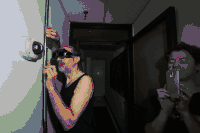

Light writing is an emerging form of stop motion animation wherein still images captured using the technique known as light painting or light drawing are put in sequence thereby creating the optical illusion of movement for the viewer.[3]
Technique
By sequencing stills taken with 4–30 second exposure as lights are moved in and through the frame this effect creates the optical illusion that the light is moving. Pans, tilts, and most other motion camera techniques can be applied with standard stop motion approaches. The most common technique is to capture multiple second exposures of light moving from one point to another in the frame. As the sequence is built the beginning and ending points of the lights motion can be moved along a given path. When the pictures are put in sequence the light seems to move with classic stop motion. Most commonly, all of the work is done in camera at practical (real world, not a studio) locations. The stills can be taken with a digital camera or film camera.
Light writing is most akin to another form of stop motion animation known as direct manipulation animation. The technique is also reminiscent of the slitscan process already used in the 1960s.
Recent history
Though the technique was employed almost one hundred years ago by Pablo Picasso it has only recently been used for mainstream advertisements.[4] Awareness of light writing was raised when Sprint Nextel unveiled an ad campaign featuring the effect in the summer of 2007.[5]
See also
- Persistence of vision, a phenomenon that retains light in the retina.
- Beta movement, the reason we perceive images in quick succession as smooth motion
- Phi phenomenon, another form of apparent motion
Notes
- ↑ Mann, S. (2014, June). The Sightfield: Visualizing Computer Vision, and Seeing Its Capacity to" See". In Computer Vision and Pattern Recognition Workshops (CVPRW), 2014 IEEE Conference on (pp. 618–623). IEEE.
- ↑ Mann, S., Janzen, R., Ai, T., Yasrebi, S. N., Kawwa, J., & Ali, M. A. (2014). Toposculpting: Computational lightpainting and wearable computational photography for abakographic user interfaces. EYE, 3, P3.
- ↑ Russell, Aaron. "cleaning up graffiti with time lapse photography". Archived from the original on 2007-10-11. Retrieved 2007-10-11.
Flickr user, lichtfaktor calls himself a Lightwriter and creates stunning photography by setting his camera to over-expose and 'painting' various lights into the shot.
- ↑ "Painting with Light". Computer Arts. Retrieved 2007-10-14.
inspiration...comes from a photograph taken of Picasso in 1924.
- ↑ Ozler, Levent (23 July 2007). "Sprint Races Ahead at the Speed of Light with Help from Brickyard VFX". Dexigner. Retrieved 2007-10-13.
The spot, shot entirely in-camera, was created from a series of still images linked together to achieve a live action effect.
External links
- Photography by urban artist CyBr from Regina
- Diaghe lets Londoners have the opportunity to discover their own light writing signature
- Wooster Collect9ve – a Celebration of Street Art
- Photography by urban artist Tofa from Berlin
- Lichtfaktors portfolio of Light Writing / Light Painting, Media Shows and Media Art
- miAm lightwriting duo from berlin
- Light painting with the iPad